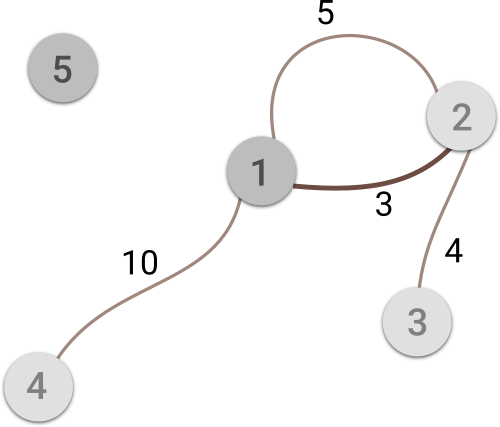Bakery
题意翻译
玛莎想要开一家新的面包店,她希望在n 个从1 到 n 编号的城市中选择一个城市作为面包店的地址。 在城市之间有 m 条双向道路, 每一条双向道路都连接一对不同的城市,通过每条道路需要耗费一定的时间。
此外,玛莎还需要选择一个城市作为仓库,共有k 个适合选择作为仓库的城市, 这些城市的标号分别为 a1, a2, ..., ak.
不幸的是,法律规定无法在能够被选择作为仓库的城市开设面包店,因此她只能在剩余的 n - k 个城市中选择面包店的地址。
现在,玛莎希望你能帮助她选择仓库以及面包店的地址,使得在仓库和面包店之间通行的耗时最小。
Input
输入的第一行包含三个整数 n, m 以及k (1 ≤ n, m ≤ 105, 0 ≤ k ≤ n) — 城市数量,道路数量以及可被选作仓库的城市数量 respectively.
接下来 m 行,每行三个整数 u, v and l (1 ≤ u, v ≤ n, 1 ≤ l ≤ 109, u ≠ v) 描述一条在城市 u 和城市 v 之间的双向道路,通过这条道路将会耗费 l 的时间。
如果 k > 0, 那么最后一行将会包含 k 个不同的整数 a1, a2, ..., ak (1 ≤ ai ≤ n) — 表示可以被选择仓库城市的编号. 如果 k = 0 那么输入数据中就没有这一行.
Output
输出在最优的方案下,从仓库前往面包店的最小耗时.
如果不存在一种这样的方案,则输出 - 1.
题目描述
Masha wants to open her own bakery and bake muffins in one of the $ n $ cities numbered from $ 1 $ to $ n $ . There are $ m $ bidirectional roads, each of whose connects some pair of cities.
To bake muffins in her bakery, Masha needs to establish flour supply from some storage. There are only $ k $ storages, located in different cities numbered $ a_{1},a_{2},...,a_{k} $ .
Unforunately the law of the country Masha lives in prohibits opening bakery in any of the cities which has storage located in it. She can open it only in one of another $ n-k $ cities, and, of course, flour delivery should be paid — for every kilometer of path between storage and bakery Masha should pay $ 1 $ ruble.
Formally, Masha will pay $ x $ roubles, if she will open the bakery in some city $ b $ ( $ a_{i}≠b $ for every $ 1<=i<=k $ ) and choose a storage in some city $ s $ ( $ s=a_{j} $ for some $ 1<=j<=k $ ) and $ b $ and $ s $ are connected by some path of roads of summary length $ x $ (if there are more than one path, Masha is able to choose which of them should be used).
Masha is very thrifty and rational. She is interested in a city, where she can open her bakery (and choose one of $ k $ storages and one of the paths between city with bakery and city with storage) and pay minimum possible amount of rubles for flour delivery. Please help Masha find this amount.
输入输出格式
输入格式
The first line of the input contains three integers $ n $ , $ m $ and $ k $ ( $ 1<=n,m<=10^{5} $ , $ 0<=k<=n $ ) — the number of cities in country Masha lives in, the number of roads between them and the number of flour storages respectively.
Then $ m $ lines follow. Each of them contains three integers $ u $ , $ v $ and $ l $ ( $ 1<=u,v<=n $ , $ 1<=l<=10^{9} $ , $ u≠v $ ) meaning that there is a road between cities $ u $ and $ v $ of length of $ l $ kilometers .
If $ k>0 $ , then the last line of the input contains $ k $ distinct integers $ a_{1},a_{2},...,a_{k} $ ( $ 1<=a_{i}<=n $ ) — the number of cities having flour storage located in. If $ k=0 $ then this line is not presented in the input.
输出格式
Print the minimum possible amount of rubles Masha should pay for flour delivery in the only line.
If the bakery can not be opened (while satisfying conditions) in any of the $ n $ cities, print $ -1 $ in the only line.
输入输出样例
输入样例 #1
5 4 2
1 2 5
1 2 3
2 3 4
1 4 10
1 5
输出样例 #1
3输入样例 #2
3 1 1
1 2 3
3
输出样例 #2
-1说明
Image illustrates the first sample case. Cities with storage located in and the road representing the answer are darkened.